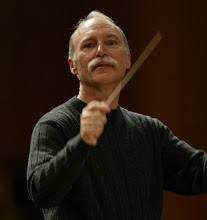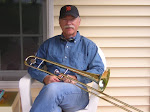
I am often asked if I ever make mistakes when I am conducting. The answer, of course, is yes. In any given concert I make hundreds of decisions and give innumerable cues and am bound to get some of them wrong. By “decisions” I don’t mean that we’re making this up as we go along. The purpose of rehearsals is to set tempos and establish our approach to any given passage of music. But we are not machines and every time we go on stage the outcome is a little different. This is especially true when we are accompanying singers. I am also inclined to get into bad habits, especially when I am tired. I may let my arms get too low and then catch the tip of my baton on the edge of my music stand and send the baton cartwheeling through the air or have a particularly nettlesome conducting problem which gets inside my head and causes me grief. Then there is the random screwup which cannot be anticipated.
In my view, if there is ever a moment of doubt or confusion during a performance it is my fault. A poor cue from me can cause a good player make a mistake, since he may have a difficult entrance which is made more difficult by my lack of clarity. In my defense, some music is...unmusical. A given passage may arbitrarily compound rapid meter and tempo changes, added or dropped measures because it was originally composed as underscore to accompany action on screen. There is no melody or internal logic per se. In this case my job is to put the downbeats in the right place and reassure musicians who may have had a lengthy time out that this is, indeed, the place where they are to make their fortissimo entrance. The most terrifying moments come when, in spite of my best efforts, the orchestra gets out of sync with itself. Say, the intricate interlocking harp far stage left is out of sync with the pizzicato strings to my right, thus sounding like musical popcorn. Or the fortissimo percussion passage lands a 1/2 beat early of the rest of the orchestra. Though I may not have created the problem I do have to fix it. This usually amounts to picking a side and sticking with it until everyone else finds us. To me this may take an eternity but in actuality may take 2 seconds and no one but those involved have any idea of the drama onstage.
To keep this in perspective, often after a concert I will be kicking myself over some dumb mistake I made and will ask Karen (who sees us every day) if she noticed it. Invariably, the answer is no. The kind of mistakes I’m talking about would not be discernible from the audience. But of course, the orchestra knows. Since the majority of our communication is through the eyes they know if there is even a moment of doubt that may not show up in an actual gesture. Having sat through hundreds of hours of rehearsals and concerts they read me like a book. The standard we are all seeking is perfection, which, of course, is never achieved.


1 comment:
Thanks for the insights. When I listen to classical or good movie score music, I like to fake conduct (some people lip-sync to top 40 or air-guitar to classic rock - I fake conduct). It's so tiring! I don't know how you keep your arms going through an entire night!
Post a Comment